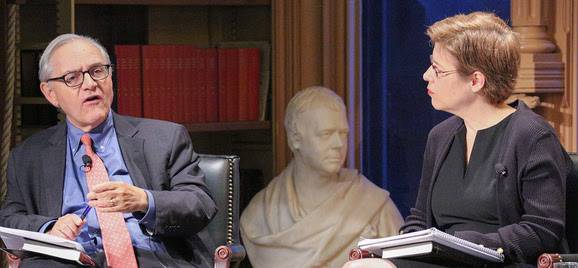Interfaith Insight - 2020
Permanent link for "After the election; One thing I know for sure" by Doug Kindschi on November 3, 2020
What will you know when you read this that I don’t know while writing
this week’s Insight? Will we know the results of the election, or
will there still be counting going on and perhaps even legal
challenges being made?
Whatever you know, whatever the results, or lack of results, I
believe I already know one thing – we will have a lot of work ahead to
heal the divisions and polarization that have occupied our public
discourse. And religion can help us heal, or can make things worse.
A report recently released by the Brookings Institution in
Washington dealt with this challenge. The 48-page report, “A Time to
Heal, A Time to Build,” provides recommendations on such topics
as religious freedom, pluralism, civil society partnerships, and the
role of faith in foreign and domestic policy. It was written by two
highly respected scholars, both senior fellows at the Brookings
Institution, Melissa Rogers and E. J. Dionne.
Rogers is a visiting professor at Wake Forest University Divinity
School and previously served as the executive director of the White
House Office of Faith-based and Neighborhood Partnerships. She also
served as executive director of the Pew Forum on Religion and Public
Life and general counsel of the Baptist Joint Committee
for Religious Liberty. E.J. Dionne, Jr. is, in addition to his
position at the Brookings Institution, a syndicated columnist for the
Washington Post and university professor in the Foundations of
Democracy and Culture at Georgetown University.
The report recognized that religion in our public arena “will be
a matter of debate, dialogue, and disagreement for as long as we
remain a free and democratic republic. Americans have been arguing
with each other over the merits of particular faiths, the existence of
God, and the meaning of their scriptures from the inception of our
nation. They have also engaged each other over the merits of religion
itself — whether it is primarily a force for progress or regression,
whether it is more unifying or divisive.”
They note that it is fundamental to a free society that there
will be legitimate differences of opinion and clashes of interest.
These differences, especially over issues of justice, can lead to
anger, which can be productive as we struggle with the right course of
action to be taken. But they can also be nonproductive as mistrust
becomes toxic. Some have described it as a “cold civil war, which
implies the possibility of violence.”
Religion is a part of our division even within the
same religious traditions and reading the same scriptures. Such
divisions contribute to larger numbers of people, especially the
young, fleeing from any regular religious identification.
Furthermore, religious identities often merge with political
identities, making the combination more dangerous. The authors cite
Martin Luther King, Jr.’s observation that religion “is not to be the
master or the servant of the state, but the conscience of the state.”
They urge that we “acknowledge that the weaponization of such
divisions for political purposes is dangerous to the nation’s
long-term stability.” We must also respect the views and commitments
of our fellow citizens across religious divides, they assert, and
“that their views and concerns are being taken into account, even when
their policy preferences are not enacted into law.” The report
continues asking us all to recognize and take seriously the many
wonderful contributions that religious groups make toward solving
problems and building community in our civil society.
The two authors come from different perspectives, one “a Baptist
committed to religious freedom and church-state separation. The other
is a columnist, an academic, and a Catholic who writes from a broadly
liberal or social democratic perspective.” They both acknowledge that
they identify with the social justice and civil rights teaching of
their respective traditions, and also embrace a commitment to
pluralism and openness.
They both believe “that it is possible to find wider agreement on
the proper relationship between church and state, and government
and faith-based organizations — and to get good public work done in
the process.” While they recognize church-state differences will
persist (as they have from the beginning of our nation), “those
differences can be narrowed, principled compromises can be forged, and
the work of lifting up the least among us can be carried out and
celebrated across our lines of division.”
The report sees “a commitment that vindicates the rights
of religious and racial minorities, of immigrants and refugees. It
stands against the proliferation of hate crimes against Jews, Muslims,
Sikhs, Black Americans” and other minorities. It is a commitment,
they write, that “honors the equal dignity of every American. It is
the only approach that can restore unity to a deeply divided nation.”
Religion can be a cause of societal tensions and strife. But it
can also be a constructive force in conflict resolution and play an
important role in economic development. Religious institutions have
often been vital providers of education and health care. Their feeding
programs, homeless shelters, and support at times of crises provide
immense social capital in our country as well as throughout the world.
Those of us committed to interfaith efforts have also practiced
the skill of dialogue with others whose beliefs are different from our
own deeply held commitments, but in such a way that leads to
understanding and respect. Let us take the same attitude to the
healing of the political differences facing America.
As we take our role in healing the polarizations in our nation,
let us use our religious commitments to bring resolution to conflict,
not to fan the flames of division. Let us be the “conscience of the
state,” not seeking the power of the state to carry out our own ideas
in ways that deny the religious rights of other citizens. Let it be
our mission to heal the divisions, seeking understanding and peace as
we go forward.


